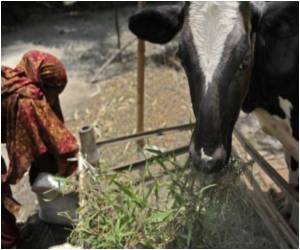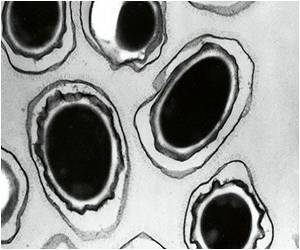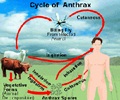In Southern Africa, from a zebra carcass on the plains of Namibia, an international team of researchers has discovered a new, unusually large virus (or bacteriophage) that infects the bacterium that causes anthrax.

The virus was isolated from samples collected from carcasses of zebras that died of anthrax in Etosha National Park, Namibia. The anthrax bacterium, Bacillus anthracis, forms spores that survive in soil for long periods. Zebras are infected when they pick up the spores while grazing; the bacteria multiply and when the animal dies, they form spores that return to the soil as the carcass decomposes.
While anthrax is caused by a bacterium that invades and kills its animal host, bacteriophages, literally "bacteria eaters" are viruses that invade and kill bacterial hosts.
Source-Eurekalert












